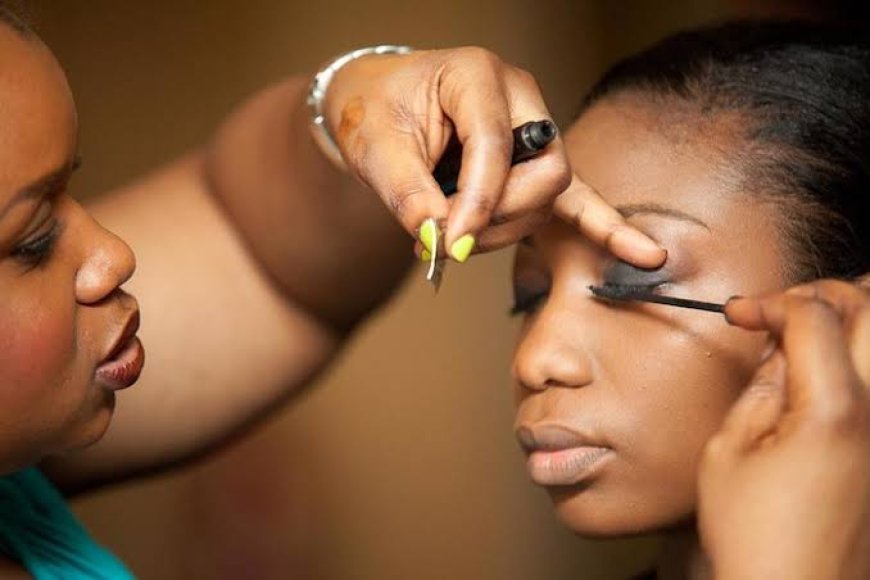The Lipstick Economy: Kenya’s Billon - Dollar Beauty Obsession

Nairobi,
Friday, 17 January, 2025
McCreadie Andias
In the glimmering streets of Nairobi, a quiet yet thunderous revolution is taking place—one that involves mascara wands, highlighter brushes, and enough lipstick shades to make a rainbow jealous.
Kenya’s cosmetics industry, valued at over Ksh. 25 Billion and growing at a rate of 6.8% annually, is more than just a business; it’s an obsession.
We dived deep into the lives of Kenyan women—those fearless, fabulous mavens who’ll spend an entire salary on a MAC Ruby Woo lipstick without batting an eyelash—to find out what keeps this glittering empire alive. here’s what the queens of cosmetics had to say.
The Foundation of It All
The first thing to know about Kenya’s makeup mania is that it’s not just for vanity. “Makeup is my armor,” says Cynthia Kamau, a 28-year-old marketing executive who starts every morning with Fenty Beauty’s Pro Filt’r Foundation. “I could be battling deadlines or heartbreak, but as long as my contour is snatched, I’m untouchable.”
Cynthia isn’t alone. According to a 2024 report by the Kenya Cosmetics and Beauty Association, 76% of women aged 20–35 in urban areas admit to wearing makeup daily, with foundation being the most popular product. Brands like Huda Beauty, Black Opal, and Maybelline dominate the scene, with prices ranging from Ksh 1,500 to Ksh 6,000 per bottle.
Lipstick: The Gateway Drug
For many, the journey into makeup begins with a swipe of lipstick. “My first lipstick was a Classic brand in Candy Apple Red,” recalls Joy Mwende, a 34-year-old teacher from . “It cost me Ksh 150, but the confidence it gave me was priceless.”
Statistics reveal that lipsticks make up 30% of cosmetic sales in Kenya, with popular brands including MAC, Revlon, and L.A. Girl. The obsession runs so deep that during Valentine’s Day 2023, Nairobi malls reported selling over 50,000 tubes of lipstick in just one week.
The Eyebrow Chronicles
In the streets of Nairobi, you're likely to encounter the national treasure that is the perfectly drawn eyebrow. From the iconic “Nike swoosh” shape to the more avant-garde feathered brow, eyebrows are serious business here. “Eyebrows are the soul of the face,” declares Sheila Nyaboke, a beauty influencer on Instagram.
To achieve these masterpieces, Kenyan women rely on products like Davis eyebrow pencils (retailing at Ksh 50), Anastasia Beverly Hills brow pomade (Ksh 4,000), and even DIY methods involving black eyeliner.
But the love for cosmetics isn’t without its quirks and controversies. During an interview, Winnie Adhiambo, a university student, confessed to skipping meals to afford her makeup addiction. “I’ve survived on mandazi and tea so I could buy NYX setting spray,” she laughs, though her eyes reveal the struggle.
A survey by Consumer Insight Africa revealed that 42% of women in Nairobi spend 10–15% of their monthly income on beauty products, with some splurging even more. “It’s not vanity; it’s an investment,” argues Winnie.
Insights from Men
While women dominate this glittery economy, men aren’t entirely on the sidelines. “I can’t date a woman who doesn’t wear makeup,” says Kelvin Otieno, a 32-year-old software engineer. “But I don’t like it when she takes two hours to get ready.”
Others, however, are skeptical. “Makeup is witchcraft,” declares Omondi Wafula, a boda boda rider . “I once took a girl swimming, and when we left the pool, I couldn’t recognize her.”
"Personally i Reffer her in her natural being, It makes me feel confident seeing her in the morning or evening and she looks more real" That's my own preference, McCreadie Andias.
The Rise of Local Brands
In recent years, Kenyan brands like Pauline Cosmetics, SuzieBeauty, and Luron have gained traction. These homegrown heroes cater to darker skin tones, a segment often overlooked by global brands. “I wanted to create products that celebrate African beauty,” says Suzie Wokabi, founder of SuzieBeauty.
Local brands now account for 25% of the market, with their affordable prices and inclusive shades making them a hit among younger consumers.
What does the future hold for the Industry?
The future of Kenya’s cosmetics industry is as bright as a freshly highlighted cheekbone. With increasing disposable income and the rise of social media influencers, experts predict the market will hit Ksh.38 Billion by 2030.
Brands are now focusing on eco-friendly packaging, organic ingredients, and expanding into rural areas.
But for the Kenyan woman, it’s not just about the brands or trends. As Janet Muthoni, a mother of three, eloquently puts it: “Makeup is self-love. When I look good, I feel good. And when I feel good, I can conquer anything—even Nairobi traffic.”
So, next time you see a woman expertly blending her eyeshadow in a matatu mirror, remember: she’s not just putting on makeup; she’s putting on power.
And that, dear reader, is the magic of Kenya’s lipstick economy.
What's Your Reaction?


































































































































































































































































































